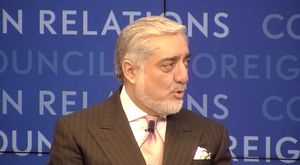About two weeks ago, the lower house of Afghanistan’s parliament, the Wolesi Jirga, voted for the Bilateral Security Agreement (BSA) between Afghanistan and the United States — the agreement governing the post-2014 presence of U.S. troops in the country — to be reviewed. Some lawmakers went as far as to argue that the agreement should be scrapped, given failures in its implementation. The vote passed, but many lawmakers were absent when it carried.
Immediately, former Afghan President Hamid Karzai, who refused to sign the BSA himself, leaving it to his successor, seized on the Wolesi Jirga’s vote. Karzai, in his final years in the presidency, grew skeptical of the U.S. role in Afghanistan.
Karzai wasn’t the only prominent Afghan political figure to revive the issue of revisiting the BSA. He was joined by others, including former acting president and leader of Afghan National Liberation Front Sibghatullah Mojaddedi, and former national security advisor Mohammad Hanif Atmar. (See Tolo News for more on that.)
The National Unity Government, however, had mostly remained quiet on the issue of revisiting the BSA. Presumably, neither President Ashraf Ghani nor Chief Executive Abdullah Abdullah would have supported such a move, given their longstanding recognition of the role U.S. forces have played in the post-2014 Afghan battlefield, providing a key advantage against the Taliban.
Revisiting — or abrogating — the BSA could seriously alter or even end altogether the legal basis for U.S. forces to remain in Afghanistan. (NATO forces are governed under a separate Status of Forces Agreement.)
In New York on Wednesday, I had a chance to ask Chief Executive Abdullah, who was in town for the United Nations General Assembly, about the recent Wolesi Jirga vote and the ensuing political attention. Abdullah clarified that the Wolesi Jirga vote was primarily focused on implementation and not a call to fundamentally push back on the BSA itself.
“It was about the implementation of the Bilateral Security Agreement — that it isn’t being implemented in a comprehensive way,” Abdullah said, speaking at an event at the Council on Foreign Relations. “When it came to former President Karzai? He took the opportunity to use that occasion for another purpose — to raise his point of view,” he added.
“It has been quite a few years since he has developed the idea that the United States is [in Afghanistan] for ulterior motives,” Abdullah went on, discussing Karzai’s motivation. “If you’re talking about the people of Afghanistan, from time to time, the people will also have complaints.”
That confirms the initial instinct after Karzai elevated the BSA issue following the Wolesi Jirga vote. It appears to be nothing more than another round of political opportunism from the former Afghan president.

































